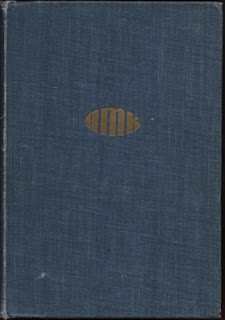Kenneth Millar/Ross Macdonald: A Checklist
Compiled by Matthew J. Brucolli
Introduction by Kenneth Millar
Detroit: Gale, 1971
Kenneth Millar was born one hundred years ago today. The first recognition of the anniversary I saw came this past May when
Linwood Barclay reviewed the new Ross Macdonald Library of America collection for the Globe & Mail.
Library of America. And why not? After all, Millar was born in Los Gatos, California. His Canadian parents returned to their home and native land a few months later, marking the beginning of a confusing childhood that included a variety of addresses and living arrangements in Vancouver, Kitchener, Wiarton, Winnipeg and Medicine Hat. Kitchener is key. He returned repeatedly to the Southern Ontario city, and as a child lived there longer than another other. It was in Kitchener that he first met and fell for fellow Kitchener-Waterloo Collegiate Institute student Margaret Sturm. In 1931, their respective short story debuts were published in
The Grumbler, the school's literary magazine. His, "The South Sea Soup Co.", suffered a printer's error: "Ken Miller".
After graduation, Millar attended Waterloo College (now the University of Waterloo), the University of Western Ontario and the University of Toronto. He married Margaret, who had dropped out to become a writer. And she did… they both did. Ken sold stories, poems and reviews to
Saturday Night, but Margaret Millar was the first to publish a novel:
The Invisible Worm (1941). The year after publication, the couple moved to Ann Arbor, where Ken had accepted a fellowship at the University of Michigan. Visits aside, the Millars never returned to Canada, settling instead in Santa Barbara, some 450 kilometres south of Ken's birthplace.
Measuring such things is a fool's game, but I think it safe to say that Millar is much more American than, say, Vladimir Nabokov, whose work is also included in the Library of America. Millar saw himself as both Canadian and American, and considered his greatest character to be the same.
I make a deal about of Millar's early years –
again – because we Canadians don't. Three years ago, I had to convince the folks at
The Canadian Encyclopedia that he was worthy of
an entry.
Margaret, too.
The greatest value in
Kenneth Millar/Ross Macdonald: A Checklist lies not in the checklist itself, now very much out of date, but in Millar's seven-page Introduction. Here he provides a rather distorted account of that very messy childhood, and the long, agonizing attempts to capture same in "Winter Solstice", an abandoned autobiographical novel. The struggle went on for years, unresolved until "transformed and simplified into a kind of legend, in
The Galton Case."
His favourite novel and I still haven't read it.
I've gone over every page in this slim volume, from Matthew J. Brucolli's Compiler's Note ("This checklist is not a bibliography…"), through Kenneth Millar's Introduction ("Having a bibliography put together is in some ways like being psychoanalyzed…"), to the
checklist bibliography checklist itself. Introduction aside, the best of it is found in the images.
The end papers are pretty great, though I do wish they were in colour.
 |
| (cliquez pour agrandir) |
The title pages, also reproduced, provide a nice reflection of the author's decade-long transition from Kenneth Millar to Ross Macdonald:
Millar was just fifty-five when this checklist
was published. No one could have known that his career was in its final years. He managed just two more novels before Alzheimer's began taking its toll. Some of the best things about the book are reproduced manuscript pages – five in all – providing glimpses of a keen mind at work… the keen mind that was lost.
 |
| (cliquez pour agrandir) |
 |
| (cliquez pour agrandir) |
I'd happily read entire Millar novels this way, beginning with "Winter Solstice". Next Library of America volume, perhaps.
Object and Access: Eighty-six pages in black boards, issued
sans dust jacket. I bought my copy two years ago at a London bookstore, a pleasant stroll from the University of Western Ontario. Price: $6.99.
Copies are held by Western and fourteen other Canadian universities. The Toronto Public Library also comes through; Library and Archives Canada does not.
Fifteen copies are listed for sale online, all but one ranging in price from US$12.50 to US$90. Condition is not a factor. The fifteenth, the exception, is inscribed by Millar to his lawyer Harris Seed, and features laid-in "a bookmark issued by the publisher that prints a poem by the author that also bears his holograph signature in ink." Clearly, the copy to present during this season of gift giving. Price: US$1250.
Related post:






























































